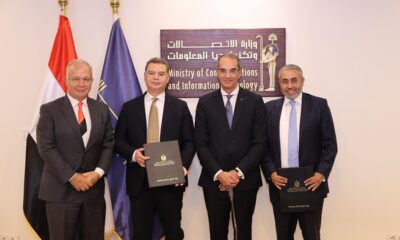Strictly Personal
Suddenly, I felt empty without my mobile phone by Ehi Braimah
Published
3 years agoon
Family, friends and associates gathered last Thursday at Hillcrest Event Centre in Okota, Lagos, for the service of songs in honour of Dr. Emmanuel Sunny Ojeagbase — popularly known as SO to his media colleagues — who passed away in Atlanta, Georgia in the United States on February 26.
Before the service began, I met top sports journalists, Larry Izamoje and Isaac Ibhafidon. There were other former colleagues who bantered with each other and we used the opportunity to play catch up. I was a former employee of Complete Communications Limited, courtesy of SO’s large heart and kindness before I moved on to other responsibilities.
The service of songs was right on schedule at 4.00pm. Later, my wife joined me from her cousin’s event which was held at Ire-Akari Estate – a shouting distance away. By the time the service ended two hours later, it was time to share more banters with familiar faces that included Segun Odegbami, Mike Awoyinfa, Dada Ajai-Ikhile, Franklin Ilaboya, and members of the Ojeagbase family.
I took one of my phones containing my MTN and 9mobile numbers with me into the hall but the last thing on my mind was that the phone would be stolen by a pickpocket. Taking the phone with me turned out to be a costly mistake. I’m usually never in the habit of taking my phones with me to such places – not even when I attend church services; I keep the phone far away from me. My attitude is that all calls and messages can wait — for a few hours. After all, we survived when we didn’t have mobile phones.
Personally, I do not believe it is a good idea to take the mobile phone or tablet into the church, a place of worship where we should reverence God in all his holiness. But again, you cannot really fault those who do so because we are in the tech age where the digital version of the bible – one of the apps downloaded from Google Play or the app store – is stored on those devices.
I have never lost a phone since 2001 when the mobile telecommunications revolution began. You can lose a phone or it can be stolen – they don’t mean the same thing. Once I have used a phone for about three to four years, I get another one and pass on the old handset to the next lucky beneficiary.
But this time, I lost my Samsung mobile phone to a thief immediately after the service of songs ended. These thieves are at every event – birthdays, weddings, services of songs, worship centres, and so on. Most of the time, they appear like “important” guests, uninvited but well dressed for the occasion; they are criminals going after the personal effects of invited guests.
Unfortunately, CCTV cameras are not installed in most of these venues by the owners. Masters of ceremony at such functions and social events should constantly remind their audiences to secure their mobile phones and other personal effects from the prying eyes of misbegotten gatecrashers and thieves at these parties.
Why did I take my mobile phone with me into the hall? Well, let us just say that I broke one of my “fundamental rules” and paid dearly for it. But you cannot blame me because I was expecting my wife to call me as soon as she arrived at the venue from her cousin’s place. And she did and joined me after I told her where I was sitting in the hall. It was the last call I received before the phone was stolen.
I was careless to have left the phone inside the left pocket of my Ankara attire, the one Yorubas call Buba and Sokoto. It was inside the left pocket of my Buba. Throughout the service, I knew the phone was with me. But when the service ended, I only took a few steps to exchange pleasantries when, instinctively, I reached out for my phone but it was gone and switched off by the thief.
“Is my phone with you,” I asked my wife, half-heartedly, to be sure even when I could recollect I never gave her the phone. At this time, Tajudeen, our driver, had the takeaway hospitality packs with him. “Please check the packs,” my wife, who was still in shock, instructed Tajudeen just to erase every doubt.
The phone was nowhere to be found. I was confused. Before we left the venue, I told Mumini Alao, Julius Ojeagbase and Thomas Ayodele, my former colleagues at Complete Communications, that my phone had been stolen. The mood changed and feelings of sympathy were expressed. Mumini, Thomas, and I still relate very well as brothers and we stay in touch regularly.
I was initially angry with myself for my carelessness and I became distraught because I knew the inconveniences that would follow retrieving the lines. Although she was feeling bad, my wife pleaded that I should not be too hard on myself. “Don’t worry, you will get another phone tomorrow,” she assured me, trying to calm my nerves. It turned out that the thieves also stole mobile phones belonging to other guests; I was not the only victim.
Throughout the journey from Okota to Ikeja, I was unhappy for being a victim. It could have been avoided. In my reckoning, the effort was like a stroll in the park for the pickpocket. My second mobile phone – containing Glo and Airtel lines – was in the car. But my MTN line that is as old as the network is my mobile office; if you get my drift. All the relevant apps are stored on the phone.
When MTN marked its 10th anniversary, I was honoured as a valued customer with gifts and a carefully worded “Thank You” letter, an exercise that I ranked as excellent public relations. MTN has continued on that path to this day.
My first mobile phone handset ever was the famous and sturdy Nokia 3310. Do you still remember the popular and iconic ring tone booming from the handset each time it rang? It was a phrase from ‘Grand Vals’ (12 – 14 secs), a Spanish classical song composed by guitarist and musician Francisco Tarrega. Well, that was back in the day –- 21 years ago.
Suddenly, I did not have access to WhatsApp which meant that I could not chat, send or receive messages. WhatsApp, as we all know, is a versatile and robust medium of communication for everyone, no matter the person’s status. WhatsApp is a fast, sure and real-time platform for engagement and conversations by individuals and groups — as long as they have access to the internet.
WhatsApp is owned by Facebook, now Meta. Mark Zuckerberg, chief executive of the company in his expansionist drive, acquired WhatsApp. Computer engineers Brian Acton and Jan Koum were young college students in their 30s but cofounded messaging application, WhatsApp, in 2009. They met previously at Ernst & Young, and much later at Yahoo! where they worked together. Acton and Koum launched the app five years after Zuckerberg created Facebook on February 4, 2004.
Then on February 19, 2014, Facebook announced it was acquiring WhatsApp when it was five years old for US$22 billion in cash and stock – its largest purchase to date. Facebook is also the owner of Instagram which the company bought for US$1 billion 18 months after IG was launched.
It is not always a good experience when mobile phones are stolen because of our emotional attachment to the phones. For several reasons, your mobile phone is your companion and personal assistant because the phone is always with you wherever you go. When it is stolen or whether you declare it missing, you instantly feel that a part of you is missing – that sense of loss surrounds you and literally eats you up as if oxygen is draining out of your body.
The phone can be a major source of distraction but can we do without it? According to the Nigeria Communications Commission (NCC), there are over 198 million mobile (GSM) active lines in Nigeria which translate into a huge pot of gold for the telecoms operators. Internet penetration is understandably massive in Nigeria and the numbers keep growing each year. MTN, Glo, Airtel and 9mobiles are the main players in the sector and I’m a customer of the four networks.
Semiu Okanlawon, a journalist and media consultant, said we have a “spiritual connection” to our mobile phones. “It is like owning a dog which is showered with a lot of affection as if it were a human being,” Semiu told me the day after my phone was stolen.
He had a similar experience in Iwo, Osun state, at the wedding reception of his niece but the story of Michael Effiong James, editor of Ovation International magazine, was different. “Instinctively, I felt emptiness around me,” Semiu remembered after a pickpocket stole his phone. He had also placed the phone inside the left pocket of his Buba but he was lucky to have apprehended the thief who was given the beating of his life by angry bystanders.
Michael was unlucky in his encounter with men of the underworld but he is lucky to be alive. After taking him around Lagos for more than four hours in the dead of the night as if it was a James Bond movie, the Ovation editor lost his car, cash, laptop and mobile phone to the armed robbers.
The interesting thing was that he found his phone when the police stepped into the matter. His car was also recovered. Mike told me he was mightily impressed with the police for their professional and thorough investigation. With the help of technology, most of our teething problems can be solved. Mike’s phone was tracked by the police using the IMEI code and the thief or receiver of the phone was caught. It will work for you if you are able to store the code in a safe place. In my case, I did not but it is a useful lesson.
In truth, it is difficult to shake off the mobile phone and pretend as if it is not important. When you are without your mobile phone or if the battery is flat because you are unable to charge it, you actually feel like a fish out of water.
In my own case, I’m completely cut off from the rest of the world but I have had to fall back on my Glo and Airtel lines since last Thursday. When I visited the Friendship and Customer Care Centres of MTN and 9mobile the next day and Saturday, I could not retrieve my lines because the National Identity Management Commission (NIMC) portal was down.
If it is a new sim card, registration can be done offline but you would have to wait for at least 72 hours for the line to be fully activated through the NIMC portal. However, if it is an old sim card like mine, the number must be re-validated on the NIMC portal before a sim swap can be enabled.
For security measures, please ensure that your mobile phone is passworded with a mix of numbers and alphabets, finger print or facial recognition. You should also password your WhatsApp and bank apps where it is applicable. Once your phone is stolen, the first thing to do is block the numbers and go through the process of restoring them, but pray that the NIMC portal does not slow you down.
Even when you lose your phone, the good thing is that you can retrieve all your data and information if you stored them digitally in the cloud. Google, for example, provides secure and durable storage for free – but only up to a threshold after which you are required to pay for the service.
I must confess that the customer relations executives were very helpful. Rosemary, Tolu and Michael at MTN and the duo of Stanley and Adebola at 9mobile displayed excellent work attitude when I visited their Friendship Centres. I salute their cooperation, commitment and sense of industry.
My two lines should have been fully restored the next day – under “normal circumstances”. That was my expectation, but I was only able to activate the lines 72 hours after my phone was stolen. Until you are able to scale the NIMC portal hurdle for revalidation of your information, telecoms operators cannot proceed to the next stage in order to retrieve your telephone numbers.
Thankfully, the NIMC portal, with its “bi-polar behaviour” like the British weather, allowed for my sim swap and successful registration after several attempts by the dutiful MTN staff on Sunday.
Braimah is a public relations strategist and publisher/editor-in-chief of Naija Times (https://naijatimes.ng)
You may like
-


Tanzania to host 6th Ocean Innovation Africa summit in February
-


Orange Egypt earmarks $52.7m to support African startups
-


10 African startups selected for final of Latitude59 pitch competition
-


Egyptian VC Flat6Labs partners ITIDA to launch programme for tech startups
-


African startups invited to pitch at this month’s Africa Tech Festival in Cape Town
-


AfriLabs to host ‘Annual Gathering’ in Cape Town
Strictly Personal
Budgets, budgeting and budget financing, By Sheriffdeen A. Tella, Ph.D.
Published
1 day agoon
November 20, 2024
The budget season is here again. It is an institutional and desirable annual ritual. Revenue collection and spending at the federal, State and local government levels must be authorised and guided by law. That is what budget is all about. A document containing the estimates of projected revenues from identified sources and the proposed expenditure for different sectors in the appropriate level of government. The last two weeks have seen the delivery of budget drafts to various Houses of Assembly and the promise that the federal government would present its draft budget to the National Assembly.
Do people still look forward to the budget presentation and the contents therein? I am not sure. Citizens have realised that these days, governments often spend money without reference to the approved budget. A governor can just wake up and direct that a police station be built in a location. With no allocation in the budget, the station will be completed in three months. The President can direct from his bathroom that 72 trailers of maize be distributed to the 36 states as palliatives. No budget provision, and no discussion by relevant committee or group.
We still operate with the military mentality. We operated too long under the military and of the five Presidents we have in this democracy, two of them were retired military Heads of State. Between them, they spent 16 years of 25 years of democratic governance. Hopefully, we are done with them physically but not mentally. Most present governors grew up largely under military regimes with the command system. That is why some see themselves as emperor and act accordingly. Their direct staff and commissioners are “Yes” men and women. There is need for disorientation.
The importance of budget in the art of governance cannot be overemphasized. It is one of the major functions of the legislature because without the consideration and authorisation of spending of funds by this arm of government, the executive has no power to start spending money. There is what we refer to as a budget cycle or stages. The budget drafting stage within the purview of the executive arm is the first stage and, followed by the authorisation stage where the legislature discusses, evaluates and tinkers with the draft for approval before presenting it to the President for his signature.
Thereafter, the budget enters the execution phase or cycle where programmes and projects are executed by the executive arm with the legislature carrying out oversight functions. Finally, we enter the auditing phase when the federal and State Auditors verify and report on the execution of the budgets. The report would normally be submitted to the Legislature. Many Auditor Generals have fallen victim at this stage for daring to query the executives on some aspects of the execution in their reports.
A new budget should contain the objectives and achievements of the preceding budget in the introduction as the foundation for the budget. More appropriately, a current budget derives its strength from a medium-term framework which also derives its strength from a national Development Plan or a State Plan. An approved National Plan does not exist currently, although the Plan launched by the Muhammadu Buhari administration is in the cooler. President Tinubu, who is acclaimed to be the architect of the Lagos State long-term Plan seems curiously, disillusioned with a national Plan.
Some States like Oyo and Kaduna, have long-term Plans that serve as the source of their annual budgets. Economists and policymakers see development plans as instruments of salvation for developing countries. Mike Obadan, the former Director General of the moribund Nigeria Centre for Economic and Management Administration, opined that a Plan in a developing country serves as an instrument to eradicate poverty, achieve high rates of economic growth and promote economic and social development.
The Nigerian development plans were on course until the adoption of the World Bank/IMF-inspired Structural Adjustment Programme in 1986 when the country and others that adopted the programme were forced to abandon such plan for short-term stabilisation policies in the name of a rolling plan. We have been rolling in the mud since that time. One is not surprised that the Tinubu administration is not looking at the Buhari Development Plan since the government is World Bank/IMF compliant. It was in the news last week that our President is an American asset and by extension, Nigeria’s policies must be defined by America which controls the Bretton Woods institutions.
A national Plan allows the citizens to monitor quantitatively, the projects and programmes being executed or to be executed by the government through the budgeting procedure. It is part of the definitive measures of transparency and accountability which most Nigerian governments do not cherish. So, you cannot pin your government down to anything.
Budgets these days hardly contain budget performance in terms of revenue, expenditure and other achievements like several schools, hospitals, small-scale enterprises, etc, that the government got involved in successfully and partially. These are the foundation for a new budget like items brought forward in accounting documents. The new budget should state the new reforms or transformations that would be taking place. Reforms like shifting from dominance of recurrent expenditure to capital expenditure; moving from the provision of basic needs programmes to industrialisation, and from reliance on foreign loans to dependence on domestic fund mobilisation for executing the budget.
That brings us to the issue of budget deficit and borrowing. When an economy is in recession, expansionary fiscal policy is recommended. That is, the government will need to spend more than it receives to pump prime the economy. If this is taken, Nigeria has always had a deficit budget, implying that we are always in economic recession. The fact is that even when we had a surplus in our balance of payment that made it possible to pay off our debts, we still had a deficit budget. We are so used to borrowing at the national level that stopping it will look like the collapse of the Nigerian state. The States have also followed the trend. Ordinarily, since States are largely dependent on the federal government for funds, they should promote balanced budget.
The States are like a schoolboy who depends on his parents for school fees and feeding allowance but goes about borrowing from classmates. Definitely, it is the parents that will surely pay the debt. The debt forgiveness mentality plays a major role in the process. Having enjoyed debt forgiveness in the past, the federal government is always in the credit market and does not caution the State governments in participating in the market. Our Presidents don’t feel ashamed when they are begging for debt forgiveness in international forum where issues on global development are being discussed. Not less than twice I have watched the countenance of some Presidents, even from Africa, while they looked at our president with disdain when issues of debt forgiveness for African countries was raised.
In most cases, the government, both at the federal and state cannot show the product of loans, except those lent by institutions like the World Bank or African Development Bank for specific projects which are monitored by the lending institutions. In other cases, the loans are stolen and transferred abroad while we are paying the loans. In some other cases, the loans are diverted to projects other than what the proposal stated. There was a case of loans obtained based on establishing an international car park in the border of the State but diverted to finance the election of a politician in the State. The politician eventually lost the election but the citizens of the State have to be taxed to pay the loan. Somebody as “Nigeria we hail thee”.
Transformation in budgeting should commence subsequently at the State and federal level. Now that local government will enjoy some financial autonomy and therefore budgeting process, they should be legally barred from contracting foreign loans. They have no business participating in the market. They should promote balanced budget where proposed expenditures must equal the expected revenues from federal and internal sources. The State government that cannot mobilise, from records, up to 40 percent of its total budget from IGR should not be supported to contract foreign loans. The States should engage in a balanced budget. The federal government budget should shift away from huge allocations to recurrent expenditure towards capital expenditure for capital formation and within the context of a welfarist state.
Sheriffdeen A. Tella, Ph.D.
Strictly Personal
African Union must ensure Sudan civilians are protected, By Joyce Banda
Published
4 weeks agoon
October 25, 2024
The war in Sudan presents the world – and Africa – with a test. This far, we have scored miserably. The international community has failed the people of Sudan. Collectively, we have chosen to systematically ignore and sacrifice the Sudanese people’s suffering in preference of our interests.
For 18 months, the Rapid Support Forces (RSF) and the Sudanese Armed Forces (SAF) have fought a pitiless conflict that has killed thousands, displaced millions, and triggered the world’s largest hunger crisis.
Crimes against humanity and war crimes have been committed by both parties to the conflict. Sexual and gender-based violence are at epidemic levels. The RSF has perpetrated a wave of ethnically motivated violence in Darfur. Starvation has been used as a weapon of war: The SAF has carried out airstrikes that deliberately target civilians and civilian infrastructure.
The plight of children is of deep concern to me. They have been killed, maimed, and forced to serve as soldiers. More than 14 million have been displaced, the world’s largest displacement of children. Millions more haven’t gone to school since the fighting broke out. Girls are at the highest risk of child marriage and gender-based violence. We are looking at a child protection crisis of frightful proportions.
In many of my international engagements, the women of Sudan have raised their concerns about the world’s non-commitment to bring about peace in Sudan.
I write with a simple message. We cannot delay any longer. The suffering cannot be allowed to continue or to become a secondary concern to the frustrating search for a political solution between the belligerents. The international community must come together and adopt urgent measures to protect Sudanese civilians.
Last month, the UN’s Independent International Fact-Finding Mission for Sudan released a report that described a horrific range of crimes committed by the RSF and SAF. The report makes for chilling reading. The UN investigators concluded that the gravity of its findings required a concerted plan to safeguard the lives of Sudanese people in the line of fire.
“Given the failure of the warring parties to spare civilians, an independent and impartial force with a mandate to safeguard civilians must be deployed without delay,” said Mohamed Chande Othman, chair of the Fact-Finding Mission and former Chief Justice of Tanzania.
We must respond to this call with urgency.
A special responsibility resides with the African Union, in particular the AU Commission, which received a request on June 21 from the AU Peace and Security Council (PSC) “to investigate and make recommendations to the PSC on practical measures to be undertaken for the protection of civilians.”
So far, we have heard nothing.
The time is now for the AU to act boldly and swiftly, even in the absence of a ceasefire, to advance robust civilian protection measures.
A physical protective presence, even one with a limited mandate, must be proposed, in line with the recommendation of the UN Fact-Finding Mission. The AU should press the parties to the conflict, particularly the Sudanese government, to invite the protective mission to enter Sudan to do its work free from interference.
The AU can recommend that the protection mission adopt targeted strategies operations, demarcated safe zones, and humanitarian corridors – to protect civilians and ensure safe, unhindered, and adequate access to humanitarian aid.
The protection mission mandate can include data gathering, monitoring, and early warning systems. It can play a role in ending the telecom blackout that has been a troubling feature of the war. The mission can support community-led efforts for self-protection, working closely with Sudan’s inspiring mutual-aid network of Emergency Response Rooms. It can engage and support localised peace efforts, contributing to community-level ceasefire and peacebuilding work.
I do not pretend that establishing a protection mission in Sudan will be easy. But the scale of Sudan’s crisis, the intransigence of the warring parties, and the clear and consistent demands from Sudanese civilians and civil society demand that we take action.
Many will be dismissive. It is true that numerous bureaucratic, institutional, and political obstacles stand in our way. But we must not be deterred.
Will we stand by as Sudan suffers mass atrocities, disease, famine, rape, mass displacement, and societal disintegration? Will we watch as the crisis in Africa’s third largest country spills outside of its borders and sets back the entire region?
Africa and the world have been given a test. I pray that we pass it.
Dr Joyce Banda is a former president of the Republic of Malawi.
EDITOR’S PICK


Ghana partners with The Gambia to provide free roaming services
Ghana and The Gambia are in the process of launching free roaming services that will enhance a West African connectivity....


Zambia: APP leader lampoons PF over pledge to reverse forfeited properties
Leader of one of Zambia’s opposition parties, Advocates for People’s Prosperity (APP), Mwenye Musenge, has criticised the Patriotic Front (PF)...


Ghanaian winger Fatawu out for season with ACL injury
Ghana and Leicester City winger, Abdul Fatawu, has been ruled out of the rest of the EPL season after suffering...


DRC authorities arrest six over break-in at Lumumba’s Mausoleum
Police in the Democratic Republic of Congo (DRC) say six people have been arrested over a break-in and vandalism at...


Finnish court imprisons Nigeria’s Simon Ekpa for aiding terrorism
Simon Ekpa, a Nigerian separatist leader based abroad, has been placed under detention by the Päijät Häme District Court...


Nigerian Senate confirms influx of terrorists from Mali, Burkina Faso into the country
The Nigerian Senate has raised the alarm over the influx of terrorists from Mali and Burkina Faso who operate in...


Tanzania to host 6th Ocean Innovation Africa summit in February
Dar es Salaam, Tanzania, has been selected to host the sixth edition of the Ocean Innovation Africa (OIA) summit from...


Miss SA opens up on why she withdrew from Miss Universe pageant
Reigning Miss South Africa 2024, Mia le Roux, has opened up on the reasons behind her withdrawal from the Miss...


SA football legend Lucas ‘Masterpieces’ Moripe passes away
South African football legend, Lucas “Masterpieces” Moripe, has passed away at the age of 71 after a long battle with...


Wanted Zambian MP who escaped from prison custody captured in Harare
A fugitive Zambian Member of Parliament (MP), Emmanuel Banda, who escaped from custody at the Chipata Prison in Eastern Province...
Trending
-

 Metro1 day ago
Metro1 day agoWanted Zambian MP who escaped from prison custody captured in Harare
-

 Sports1 day ago
Sports1 day agoSA football legend Lucas ‘Masterpieces’ Moripe passes away
-

 Politics1 day ago
Politics1 day agoUgandan opposition politician abducted, wife says
-

 Culture1 day ago
Culture1 day agoMiss SA opens up on why she withdrew from Miss Universe pageant


